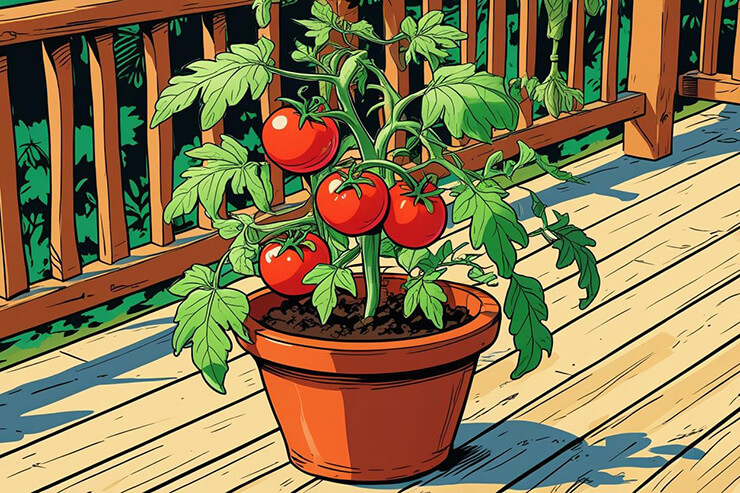Read by Michael Flamel

You’ve likely tossed a tomato slice on a sandwich or simmered them into a sauce. But have you ever stopped to think about how this vibrant red fruit—yes, fruit!—might be doing much more than just adding flavor to your meals?
From boosting heart health and protecting your skin to reducing your cancer risk, tomatoes have quietly earned their place at the top of the health-food pyramid. And while they may not neutralize skunk spray (more on that later), tomatoes pack a nutritional punch that could rival any superfood out there.
From Ancient Mesoamerica to Your Garden
Tomatoes (Solanum lycopersicum) trace their roots to western South America and Central America. The Aztecs were cultivating tomatoes as early as 700 A.D., long before Europeans got a taste for marinara. In fact, the word “tomato” comes from the Nahuatl (native Mexican and Central American) word tomatl, and the fruit made its way to Europe in the 16th century via Spanish explorers.
Today, tomatoes are one of the most widely grown—and eaten—foods on the planet. And for good reason: they’re versatile, delicious, and exceptionally good for you.
Tomatoes and Heart Health: A Red-Hot Relationship
Heart disease remains the leading cause of death in the United States, but a humble tomato might offer some help. Tomatoes are rich in lycopene, a powerful antioxidant that gives them their red color—and gives your heart some serious protection.
Studies have shown that people with low blood levels of lycopene and beta carotene are at greater risk of heart attacks and strokes. Clinical research suggests that lycopene can help lower LDL cholesterol (the “bad” kind) and reduce inflammation, two major contributors to cardiovascular disease.
Tomato-based products—especially concentrated ones like tomato paste—also show promise in improving the function of the endothelium, the inner lining of your blood vessels. Better blood vessel health means a reduced risk of blood clots, improved circulation, and ultimately, a happier heart.
Tomato vs. Cancer: A Natural Defense
Tomatoes may not be a miracle cure, but they are showing serious potential in cancer prevention. Observational studies have linked diets high in tomatoes to fewer cases of prostate, lung, and stomach cancer.
Once again, lycopene takes center stage. This antioxidant doesn’t just give tomatoes their color—it’s been associated with slowing the growth of cancer cells and boosting the body’s natural defense systems. Cooking tomatoes actually increases the availability of lycopene, so sauces and pastes are more than just tasty—they’re potent!
And it’s not just about the guys. A study in women found that high levels of carotenoids, another group of antioxidants in tomatoes, may reduce the risk of breast cancer.
While more high-quality human research is needed, the signs are encouraging—and tasty.
Tomatoes for Glowing, Sun-Protected Skin
It’s not just your heart and cells that benefit from tomatoes. Your skin loves them, too.
One study found that people who consumed about 1.3 ounces (40 grams) of tomato paste with olive oil daily for 10 weeks experienced 40% fewer sunburns. That’s a pretty impressive natural sunscreen boost.
The secret again? Lycopene and its fellow plant compounds. These antioxidants help protect your skin from oxidative stress caused by UV rays, which can age skin and increase the risk of skin cancer.
So the next time you’re making a pizza or pasta sauce, think of it as skincare in disguise.
What Tomatoes Can’t Do: The Skunk Spray Myth
Here’s where we bust a myth.
There’s an old wives’ tale that says bathing in tomato juice will neutralize the smell of skunk spray. In truth? It doesn’t work—at least not the way people think.
Tomato juice doesn’t eliminate the odor; it masks it temporarily. The skunk’s sulfuric compounds remain. (For true relief, science recommends a mixture of hydrogen peroxide, baking soda, and dish soap.)
Still, it’s not all bad—at least your nose will enjoy the scent of tomatoes more than skunk.
Why Grow Your Own Tomatoes?
Tomatoes aren’t just healthy—they’re one of the most rewarding foods you can grow yourself. Homegrown tomatoes are often more flavorful, fresher, and free of pesticides.
Growing your own tomatoes also gives you control over the varieties—heirloom, cherry, Roma, beefsteak—and how they’re used, from canning to fresh salads. And let’s be honest, is there anything better than picking a sun-warmed tomato straight off the vine?
Home gardening also adds a mindfulness and wellness factor that’s hard to beat.
Easy, Healthy Ways to Enjoy Tomatoes
Getting more tomatoes into your diet is simple. Try these ideas:
- Add sliced tomatoes to sandwiches or wraps.
- Make your own tomato sauce with garlic and herbs.
- Roast cherry tomatoes as a side dish.
- Add tomato paste to soups and stews for a flavor and nutrient boost.
- Dice them into homemade salsa or gazpacho.
- Mix tomato juice with lemon, celery, and hot sauce for a savory morning boost.
Remember, cooking tomatoes increases their lycopene content, so don’t be afraid to turn up the heat.
The Bottom Line
Tomatoes are more than just a colorful addition to your garden or plate—they’re a powerhouse of nutrition and preventive health. Whether you eat them raw or cooked, in a sauce or salad, tomatoes offer protection for your heart, your skin, and potentially even against certain cancers.
They’re proof that something so simple and so delicious can also be profoundly good for you.
So, the next time you’re savoring that spaghetti sauce, sipping tomato soup, or slicing one for a BLT, remember—you’re doing your body a favor.
Here’s to your health, one tomato at a time! ❖
Did you know tomatoes had all these benefits? Tell us your favorite healthy ways to grow, cook, or preserve tomatoes in the comments below!


 Previous
Previous


